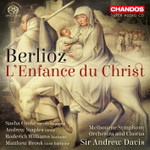|
Back
05/19/2019
Hector Berlioz: L’Enfance du Christ, opus 25, H. 130
Sasha Cooke (Sainte Marie), Roderick Williams (Saint Joseph), Matthew Brook (Hérod, an innkeeper), Shane Lowrencev (Polydorus), Andrew Goodwin (a centurion), Andrew Staples (a narrator), Dale Barltrop (concertmaster), Melbourne Symphony Chorus and Orchestra, Warren Trevelyan-Jones (chorus master), Sir Andrew Davis (conductor)
Recording: Hamer Hall, Arts Centre Melbourne, Victoria, Australia (June 14, 16 and 18, 2018) – 89’52
Chandos #CHSA 5228(2) [Super Audio CD] (Distributed by Naxos of America) – Booklet in English, German and French

   
For a man who wasn’t necessarily religious, Hector Berlioz was ironically drawn to the aura of the divine. For this work the Frenchman also wrote his own text set upon a foundation of French verse that houses its own originality. Sir Andrew Davis has talked about his special fondness of L’Enfance du Christ, and in this Chandos capture, this performance is completely ‘top of the charts’. The communion could only be accomplished by incorporating a scrupulous roster of six “primo” singers and a well-groomed chorus...this recording has it all.
Turn to the New Testament’s Matthew 2:13, and one finds Hector Berlioz’s generalized manuscript for L’Enfance du Christ. The oratorio, termed a trilogie sacrée, is broken into three parts, but Berlioz exercised his independence beyond the Holy Bible’s chapter by including “Herod’s Dream” [Part I] as the foreboding catalyst. Andrew Staples holds the musical framework together from beginning to end with extreme clarity and erudite understatement.
Several opening scènes open as fugal introductions. The foreboding “Marche nocturne” anticipates Matthew Brook as the tormented Herod, haunted by soothsayers’ prognostications whose acerbic energy is underscored by the Melbourne Symphony’s frenetically running string lines.
Berlioz’s sudden shift of gears turns to Sasha Cooke’s Mary (Scene V) and her refreshing spirit, wholesome tone, and pure benignity and thinned vulnerability. Roderick Williams’ honeyed baritone register embraces his wife with warmth during their duet (“Ô mon cher fils”) that deeply fulfills. But it’s the choral responses that also shine with much delectability, and it demonstrates just how carefully Sir Andrew Davis treats L’Enfance du Christ with such dignity.
The angst in crossing the desert to Saïs is profoundly elicited by Berlioz’s use of a staggering ostinato two note waver, heightening Mary’s and Joseph’s tension and mounting uneasiness. Matthew Brook returns in Part III as the gracious Ishmaelite who welcomes the exhausted couple and baby into his home. His bass-baritone voice is perfectly matched to convey the optimism and what the future holds for Jesus.
Pockets of orchestral clauses hold the listener in awe. The “Trio for Two Flutes and Harp” acts like a caprice of a needle. Part II’s “Overture” re-emphasizes the piece’s layered fugal theme, exemplified by a cross section of brilliantly articulated instruments. Maestro Davis maintains an even cadence and a pragmatic approach to Berlioz.
“Delicate and sensitive in persuasion” can easily describe the pathway of the Melbourne Chorus. Warren Trevelyan-Jones sedulously “walks on eggshells” as he caresses Berlioz’s choral passages with utmost care: radiant sweeps inside the “L’Adieu des bergers à la Sainte Famille”, the angelic softness of “Hosanna! Hosanna!”, and the “Epilogue’s” sensitive touches are some of the finest moments in this extraordinary œuvre. Every vocal close is impeccable. Superb!
The Parisian press, usually critical in response to Berlioz’s works, favorably received L’Enfance du Christ. This assessment is not surprising when hearing just how caring Hector Berlioz was in handling this biblical story on his own time, in his own space and on his own plane.
Honneurs suprêmes to Sir Andrew Davis, principals, the Melbourne Symphony Orchestra and Chorus and Chandos. Marvel at this wondrous oratorio.
Christie Grimstad
|